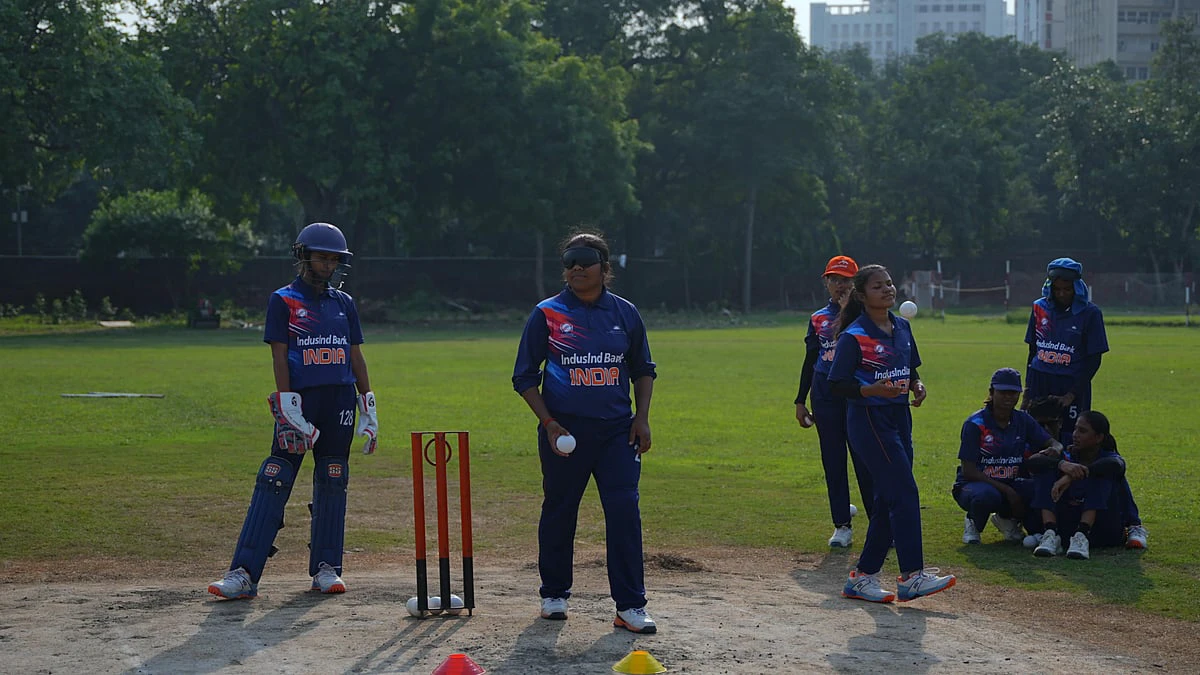A ball rattles across the patchy ground behind the Ranga Rao Memorial School for the Differently Abled in Mysuru. A dozen girls face the batter, anticipation rising as their voices merge.
They are blind, yet they move with practiced precision: a crack, a shuffle, then silence.
Among them stands Deepika TC, a thin girl from Tumakuru whose smile often arrives before her words. She came to the school not to play cricket but to “learn to live with blindness,” as her parents said. Soon, that goal gave way to cricket’s unexpected pull. Her father, Chikkathimappa, a farmer, pressed her hand and whispered, “Be brave.” At first, bravery meant walking across the dormitory without bumping into benches. Later, it meant raising a bat and listening for the rattle.
“I always dreamt of playing cricket,” she says, laughing. “I never knew blind cricket was played at national or international levels.”
“Forget blind women,” says Shika Shetty, manager of India’s blind women’s team. “Even sighted women like me hear, ‘Why should women play sports?'”
She laughs, but the humour is tired.
“Parents and teachers hesitated to let these girls out. They only expected studying and jobs. We explained that sports builds confidence and independence. Eventually, they saw the change.”
Of grit and determination
Now, Shika’s girls have participated in the first Women’s T20 Cricket World Cup for the Blind, hosted by India (November 11 to November 23). When Deepika learnt she would captain India, she simply adjusted her scarf, smiled, and asked about practice. “The only challenge is communication. We use English and Hindi,” she says.
Meanwhile, in another corner of the ground, Simu Das from Guwahati waits for her turn to bat. “Before cricket, my life was pathetic,” she says. “My parents are poor,” she adds. After she took to cricket, she has been able to send home her earnings from playing-enough for her parents to buy a small house.
A similar story belongs to Simranjeet Kaur of Kota, Rajasthan, who discovered cricket in her teens. “Before cricket, I never had the courage to step out. Now I travel to play. My papa (Gurpal Singh), a kabaddi player, encouraged me.”
Her story echoes those of blind women from across seven states. They have won gold at the 2023 IBSA World Games in Birmingham, beating Australia, before their tryst at the World Cup.
Following the 2017 men’s blind T20 World Cup, Samarthanam and the Cricket Association for the Blind in India (CABI) began building a structure for blind women’s cricket-district, state, and national. Their first international match was against Nepal in 2019.
“Hosting the first Blind Women’s World Cup has been our dream,” says Dr Mahantesh G Kivadasannavar, CABI Chairman and Samarthanam Founder. The tournament includes teams from Nepal, Sri Lanka, Australia, the United States, and Pakistan, apart from India.
The Indian team was thrilled to receive a video message from their role model and part of the winning Indian women’s cricket team at the recent World Cup, Jemimah Rodrigues, wishing them success.
As the women train, they talk of parents and coaches, of the journeys from distant towns, of friends who said, “You cannot do this,” and of those who insisted, “You must try.”
For Deepika, Simu, Simran, and the entire Indian team, this is not only about cricket but about showing that vision does not always come from the eyes-and that courage is sometimes heard in the rattle of a ball rolling towards the boundary.
